Porsche is doubling its range of driving fun in the new 911 generation by launching the all-wheel drive Porsche 911 Carrera 4 on the market in four model versions. The new sports cars with their uniquely powerful proportions combine the excellent traction and driving stability of the active Porsche Traction Management (PTM) system with the benefits of lightweight design, new engines and additional assistance systems - traction and dynamics to the fourth power.
2013 Porsche 911 Carrera 4 Cabriolet
2013 Porsche 911 Carrera 4 Cabriolet
2013 Porsche 911 Carrera 4 Cabriolet
2013 Porsche 911 Carrera 4 Cabriolet
2013 Porsche 911 Carrera 4 Cabriolet
2013 Porsche 911 Carrera 4 Cabriolet
2013 Porsche 911 Carrera 4 Cabriolet
2013 Porsche 911 Carrera 4 Cabriolet
2013 Porsche 911 Carrera 4 Cabriolet
2013 Porsche 911 Carrera 4 Cabriolet
Despite enhanced engine and driving performance, all four models consume significantly less fuel than their respective previous models; in some cases the savings add up to as much as 16 per cent. So, the new all-wheel drive 911 is consistently following the same course as the 911 Carrera Type 991 presented in 2011. The Carrera 4 takes top efficiency and performance to an even higher level.
The most distinctive identifying feature of the 911 with all-wheel drive is still the wide rear section: compared to the two-wheel drive 911 Carrera models, the wheel housings at the rear are each 22 mm wider, and each of the rear tyres is 10 mm wider. This increases the track width of the 911 Carrera 4 by 42 mm, and the track width of the S-model by 36 mm. The impressive look at the rear is highlighted by an exclusive tail-light panel with parking light and rear light functions. The tail-light panel runs directly under the spoiler edge and visually joins the two rear lights. For one, this emphasises the powerful back end of the vehicle; for another, it lends the all-wheel drive models a unique and very distinctive night design. When the lights are turned on, the illuminated rear light band visually connects the rear lights and signals that a new all-wheel drive 911 is driving ahead.
All-wheel drive
The new all-wheel drive 911 cars are equipped with the latest generation of Porsche Traction Management (PTM). It is based on the system of the 911 Turbo, Type 997 and was especially optimised in its control strategy with a special focus on improving efficiency and fuel economy.
As a result, PTM now supports the typical Porsche coasting function of the 911 equipped with PDK. If the vehicle is coasting without drive power, the PTM clutch is opened. This reduces the braking torque of the all-wheel drive system, which in turn improves fuel economy.
Transmissions: seven speeds for dynamics and efficiency
The Porsche strategy for realising efficient performance includes two transmissions that deliver uncompromising sportiness as well as long gear ratios that improve fuel economy: the world's first seven-speed manual gearbox in passenger car production and the Porsche Doppelkupplungsgetriebe (PDK), which also has seven gears. This means that drivers of the 911 Carrera with a manual gearbox can enjoy the same fuel economy advantages that the PDK is known to deliver: up to 19 per cent lower revs at the same vehicle speeds, which improves fuel economy by up to ten per cent in constant speed driving.
Chassis and control systems
In developing the new 911 Carrera generation, preparations were already made in tuning the chassis for the additional driving of the front wheels in the new all-wheel drive 911. That explains why the vehicle is largely based on the rear-wheel drive version. A significant exception is the wider track of the rear axle. Together with PTM all-wheel drive, this offers even higher stability in bends, even with powerful acceleration.
As in all 911 models, the longer wheelbase - lengthened by 100 mm compared to the previous model - provides for significantly better driving stability at high speeds. Other systems that guarantee top driving performance - some standard and some optional depending on the model - are the further advanced Porsche Active Suspension Management (PASM), dynamic engine mounts, Porsche Dynamic Chassis Control (PDCC), innovative electro-mechanical power steering, Porsche Torque Vectoring (PTV), a high-performance brake system and the car's wheels and tyres.
PASM sport chassis with downforce at the rear axle
The PASM sport chassis - which sports a ride height lowered by 20 mm and an aerodynamic package - is also offered in the new Porsche 911 Carrera 4 models. This aerodynamic tuning results in less lift at the front axle and even provides downforce at the rear axle. In sum, the lift is zero. As a result, a 911 Carrera 4 with PASM sport chassis delivers exceptionally good road contact at high speeds and reacts very spontaneously and directly to steering inputs.
Driving through a bend faster and safer: Porsche Torque Vectoring
Offering even further enhanced agility in the new 911 cars is Porsche Torque Vectoring (PTV), which is standard in the Porsche 911 Carrera 4S and is available as an option in the Porsche 911 Carrera 4. There are two versions of the system: PTV with mechanically locking differential for cars with a manual gearbox and PTV Plus with electronically controlled, fully variable differential lock for PDK vehicles. Essentially, when driving through a bend PTV/PTV Plus uses specific brake interventions at the inside rear wheel to improve agility and steering precision with a highly dynamic style of driving, and the differential lock improves the car's acceleration potential coming out of a bend.
Even sportier at the press of a button: from Sport button to Sport Chrono package
All 911 Carrera cars already have a Sport button as standard. It lets the driver choose tuning optimised for comfort and fuel economy or tuning that emphasises sporty performance. The optional Sport Chrono package with the additional Sport Plus button enables an even wider spread between sporty tuning and ride comfort in everyday driving. Besides configuring all relevant systems and functions for maximum performance, the Sport Chrono package also has controlled dynamic engine mounts.
New in the Sport Chrono package: downshifting with double declutching
The Sport Chrono package includes an analogue and digital chronometer; the optional PCM also has a performance indicator with memory function. Another new feature of the optional Sport Chrono package is that for vehicles with a manual gearbox it has been extended to automatically double declutch during downshifts in Sport Plus mode. In quick shifting, this better adapts engine speed to the lower gear, letting the driver utilise the engine's power or braking ability more effectively.
Porsche Dynamic Chassis Control for impressive performance gains
Making a decisive contribution towards impressive performance gains in the new 911 generation is Porsche Dynamic Chassis Control (PDCC) - an optional feature of the Porsche 911 Carrera 4S. With this system, the 911 attains a new level in terms of lateral acceleration and handling. Body roll of the vehicle is nearly fully compensated by the variable stabiliser system up to maximum lateral acceleration, e.g. when steering into a bend, driving through a bend or quickly changing lanes. Because of the reduced roll angles, the tyres are always optimally aligned to the road surface, so that they can transmit maximum force in any direction. This boosts potential vehicle speeds when driving through bends.
Body and roof
The innovative lightweight body of the new 911 Carrera range was developed for top driving characteristics in both the Coupé and Cabriolet - and for rear-wheel and all-wheel drive versions - with just minor modifications.
All models share the weight advantages of the aluminium-steel construction with substantially improved rigidity, supplemented by local reinforcement elements in the soft-top 911s. The new 911 Carrera cars with all-wheel drive are up to 65 kg lighter than previous models.
911 Cabriolet: unique fabric roof with coupé properties
An eye-catching feature of the soft-top all-wheel drive 911 cars is the panel bow top - a new development by Porsche. This innovative technology has succeeded in creating a previously unattainable coupé-like roof arch of the soft top when it is up, and this leads to aerodynamic advantages as well. In addition, the weight of the entire top nearly matches that of the previous model, despite being longer and offering significantly improved comfort. Another innovation in all soft-top 911 Carrera cars is the integrated and electrically deployed wind deflector. Installing and removing it are now a thing of the past.
Interior and features
The interior of the new all-wheel drive 911 cars that is making its appearance is based on the new generation concept. The central design element is the centre console that rises towards the front. It provides excellent ergonomics that integrate both the driver and front passenger.
The operating concept permits uncomplicated and intuitive control of key vehicle functions. Already equipped with standard features that are extensive and high-end, the new 911 Carrera 4 cars can be customised to a wide variety of individual tastes with an extensive list of options.
Sport seats for dynamic driving and long trips
The defining interior element of all 911 Carrera cars is the standard sport seat system with electrically adjustable backrest angle and seat height. The optional sport seats with fully electric 14-way adjustment add - in addition to adjustments of the standard seats - electric adjustment of the longitudinal position, seat cushion angle, seat cushion depth and four-way lumbar support. The Sport Seat Plus option that is also available offers 18-way adjustment and more prominent side supports; it also offers adjustment of the side supports on the seat and backrest for optimal lateral support in all driving situations.
New: lightweight sport shell seats made of fibre-reinforced polymer
For 911 Carrera drivers with very sporty performance standards, Porsche offers new especially lightweight sport shell seats with folding backrests, integrated thorax airbag and manual longitudinal adjustment. The seat shell is made of glass-reinforced and carbon-reinforced polymer with a visible carbon surface. A special feature is the pivot point of the backrests, which lies high in the side supports. The lateral support that is characteristic of race car shell seats is thereby also assured in the pelvic area. However, the folding backrest still enables convenient loading of the luggage compartment in the rear.
Articles Source : NetcarShow

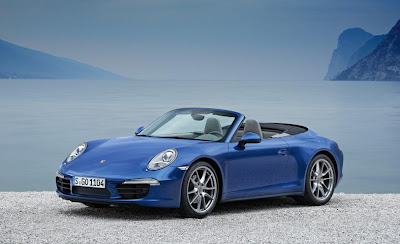
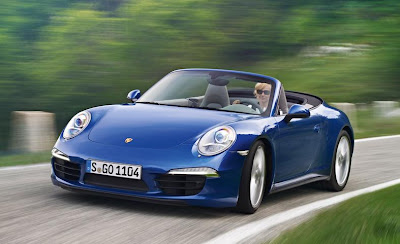

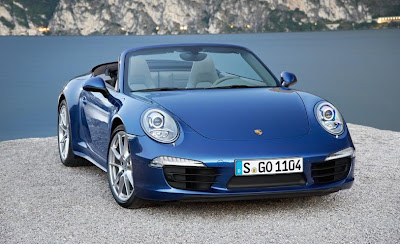
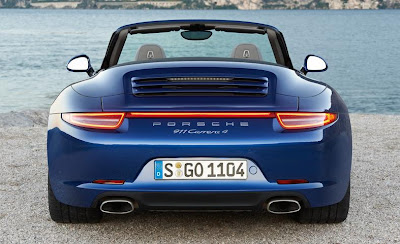
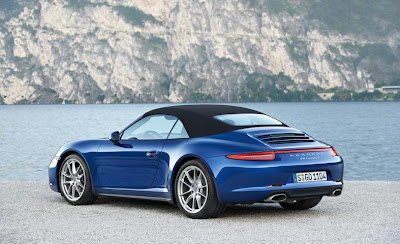

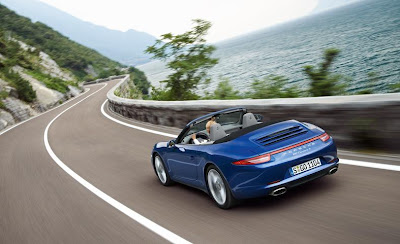
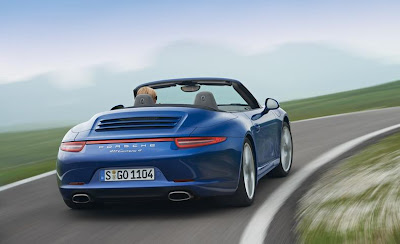
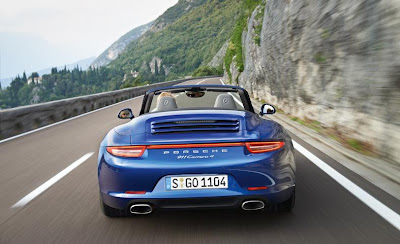
No comments:
Post a Comment